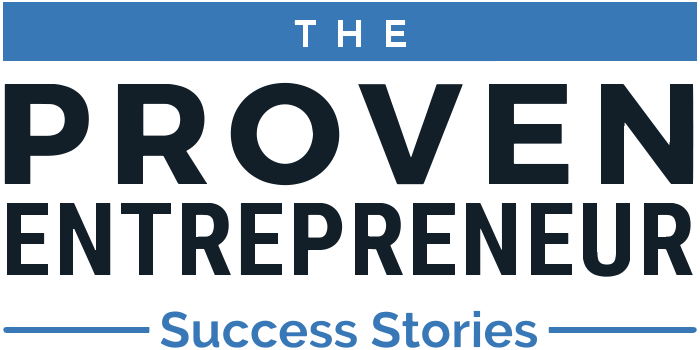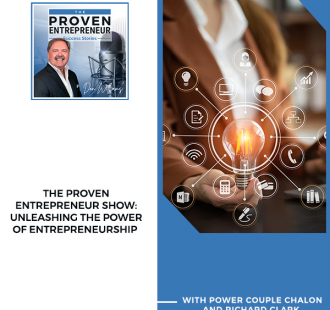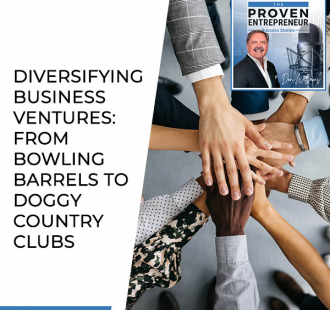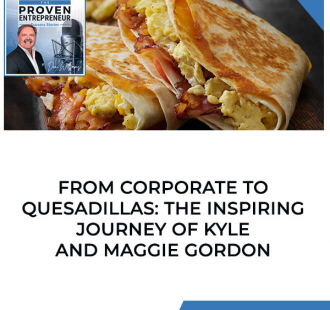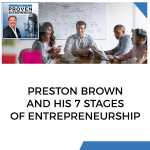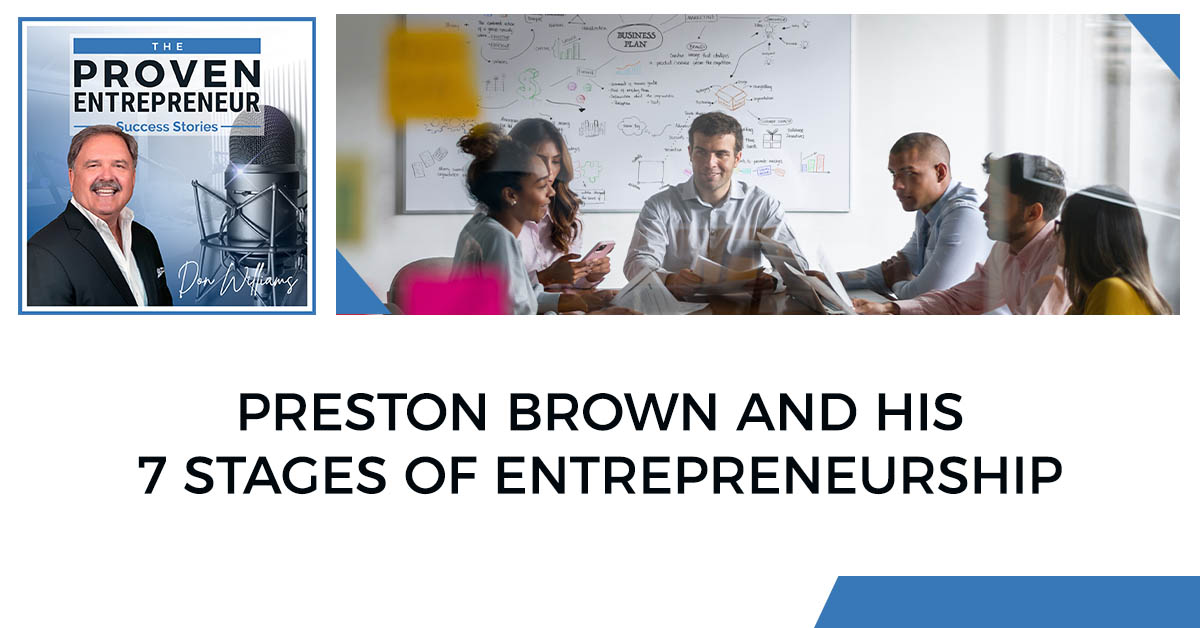
Success in business. How can you achieve it? What is the formula to grow your business? In this episode, Preston Brown, a Business Coach, discusses the seven stages of entrepreneurship and the formula to grow your business. Preston suggests that you must look at the three filters, productivity, profitability, and purpose, before you invest or start any company if you want to be an entrepreneur. He also identifies four core values we should have in every area of life. Tune in to this insightful episode with Preston Brown!
For information on how to work with Don visit Work With Don Williams
You can also reach out to Don Williams at https://donwilliamsglobal.com
Please join Don and his businesses in support of St. Jude’s Children Research Hospital in its Mission to cure Childhood Cancers. You can donate to St. Jude at stjude.org/donate
—
Watch the episode here
Preston Brown And His 7 Stages Of Entrepreneurship
$180MM Revenue And Growing
I have a real treat for you with our guest in this episode. Preston Brown hails from El Paso, Texas, and is a serial entrepreneur, owning multiple companies and doing over $180 million in revenue. He’s a speaker, a coach, a consultant, and is doing the deal himself. Welcome, Preston Brown.
Thank you, Don. It’s such a privilege to be here. I’m so excited.
I’m thrilled that you could join us. Let’s hop right in. I want to take you back to little Preston. When you were 5 to 18, in your house, however that household was situated, was there someone who set an entrepreneurial example for you or in your family, are you the trailblazer?
Let me give you the right and easy answer. I did not have an example but I had enough pain to make myself into one. Most people will judge a story by the ending and never read the whole book. I’m the 40-year-old guy whose billionaire buddy rented me an island in the Maldives for my 40th birthday so that we could all celebrate together.
I’m the guy that has 2 airplanes, 18 businesses and all this revenue. I’ll tell you one thing, revenue’s vanity and profit is sanity. I do make good profits too but if you hear somebody with big revenue, a lot of times they are full of crap so be very careful and go verify before you listen to some guru or somebody out there spouting BS. Get the whole story.
I’ll tell you my beginnings. I grew up in a trailer park in a little suburb outside of El Paso. If you like trailer homes, you should visit it. It’s nice. There are trailer homes and trailer trash. I grew up there as the trailer trash in the trailer home. I grew up with this wonderful family. We do not have a lot of money. There were times when we couldn’t pay our water bill. My mom got a membership to a country club so that she could take us there.
The country club was $75 a month but the water bill with this local water guy was $300. We would go shower at the country club because it was cheaper to shower there. There was some liberty in the house but there was never an entrepreneur. When I’m about seven years old, my dad said, “I’m going to set our family free. We’re going to live life on TV, not watch it on TV. I’m going to open my business.” The man was a genius. He was a member of Mensa. He’s a beautiful man.
He was a metallurgical engineer by trade but he wasn’t that by education. He made a car in the ‘80s. They got 1,500 miles per gallon. It never went more than 50 miles an hour to be full, fair and transparent. He helped pioneer stereo lithography, which is radio waves through plastic, which operates as cutting tools and you could make a brain gear and turn 100 different gears on all these axes that turned each other without ever using a cutting tool of radio waves.
To give you some of his background, he was amazing. He worked on a project where he could print three-dimensional stem cells and they’re still working on this. My dad has passed but one day you’ll be able to print your heart and add DNA to the stem cells and grow your heart. It’s phenomenal stuff. The guy was a genius but he was not a business guy.
He opened a business in this little shed next to our house. I remember we stole an air conditioner. My mom never told him that story. We steal an air conditioner from somebody’s yard and installed it in the shed because we didn’t want him to die of heat stroke. He would work out there from 6:00 AM to sometimes 8:00 or 9:00 PM and he would make things for people. He worked at colleges and all these companies. He didn’t know how to bill, collect or charge well but as always happens, there’s an adversity story.
One day, my mom loses her job. She was a teacher in public schools and private schools but didn’t get paid much. When you don’t have a lot of money, it gets scarce real quick when there’s a new entrepreneur and a startup company that doesn’t know how to collect a charge. We had so much love in the family. There wasn’t a lot of pain.
I remember this fight like it was yesterday. I don’t remember everything that was said but I remember one sentence in particular. The cast iron frying pan flies across the room, lodges in that thin cardboard trailer wall and clanks to the floor. My mom ended the argument on this. She said, “A real man can feed his family. If you don’t collect what you’re owed, don’t come home.”
I got to be the charity case. I didn’t understand what was going on. Here’s my mom, my hero and my dad, whom I want to be. This guy is a badass but he’s getting beaten with big, broad shoulders. If you ever look at me, I got a giant head and tiny shoulders. He has big broad shoulders, is a star football player and is a genius, everything any guy wants to be but here’s my mom saying these words and I’m watching him break. I get in his truck with him. We drive up to a house not far from where I live.
My dad walks in all 6’4 foot and starts talking to this guy at 5’9. I can see my dad that he could kill this guy with a napkin. I know what’s going to happen. He’s going to demand his money. We’re going to get his money. We’re going to go home and feed the family. It’s going to be fine. Everything’s good but it didn’t go that way because no good story does. My dad went for demanding, moved into asking, started with drawling and begging.
We walked out of there with a few $20 and whatever he had in his pocket. My dad was not much of a talker ever. He was more of the guy that got the stuff done but he didn’t talk at all. I could see this stoic powerful man. We were climbing the truck and driving down to the Smiths. It’s Albertsons now. We buy a box of ramen noodles and that’s what we can afford and some other things. I ride back home with this box of ramen noodles. I’m trying to talk to him and he won’t talk.
As we’re driving, I can see tears come down his eyes. My mother had told him, “A real man can feed his family. If you can’t feed your family, don’t come home.” My dad that day chose to give up on his dreams of a small business because he still wanted to be her husband and my dad. When I’m seven years old, I’m experiencing hatred for the first time in my entire life. I hated that man. Had I been a seven-year-old with a pistol, I would’ve killed that man where he stood because he took something beautiful from a beautiful man. It set me in a direction. My first business was selling lemon juice packs when I was a kid.
My mom was studying psychology so she had an impact too. She always said, “Everybody has a game. Find out the game and you’ll figure out how to win. If you figure out their game, you’re going to figure out how to win.” This made me pretty transactional and relegated to conditional love but I built some businesses. I went and figured out games. I learned how to win. I became this corporate marauder in little El Paso, Texas.
Everybody has a game. Figure out the game, and you'll figure out how to win. Click To TweetI would enter industries and start dominating. I would start becoming the biggest player in the industry and the most successful but nobody even knew who I was. I started getting a bad reputation because I was cutthroat as hell. They didn’t meet me. The people that did meet me, got close to me. They were like, “This guy’s a real love bug. He cares. He’s donated to charities and doing all these things but when he goes into an industry, nobody sees him.”
A little tip for anybody that might be out there like me, if a lion doesn’t tell his story, the hunter will. I had a very good friend that told me that. There’s a good reason if you’re an entrepreneur to get on social media and start telling the real story. Get out there and do the podcast because there’s no reason to take some of the negative flack for all the good things you’re doing.
I was creating far better jobs, opportunities for customers and everything else but my competitors were telling my story while I grew and achieved. I was relegated to this conditional love thing until about 2019. That was probably worth $10 million or $15 million at that point. I’d given my entire life to money. Money was the meaning of life because the wound that my dad had received was my mission in life at that point which was to heal. I needed to go and prove that I could.
In 2019, my dad went to sleep in his favorite chair. Judge me if you will for this but he went to sleep and went home. That was the worst and best day of my life because my dad, the greatest teacher I’ve ever had, left. When he left, I knew I didn’t get to spend time with him. I realized what was important I could have. I built this business and all this stuff. Money was the meaning of life and it turned into this shift.
In 2019, I don’t even know how old I was back then. I’m not good on past dates. The shift was I looked at my kids, my wife and all these people that I was giving all of my time to the business and not enough to them and love became the meaning of life. I built these formulas for business, which I had tuned. Every time we’d have problems, I’d built these formulas and it was the one area where I was succeeding.
I wasn’t succeeding phenomenally in my marriage or as a father. I didn’t succeed phenomenally going out and having that. I had an amazing relationship with my dad. He was so proud of me. We’d have lunch monthly but we should have had lunch weekly. You never get to pass back and I’ve looked at all these formulas that I built large companies with. I said, “I’m going to use these formulas and cut out all the BS.”
I started tracking formulas with my first real business buying and selling homes. I created, shifted them and all that. I’m going to dedicate my time to family even if I could shut down half my businesses. Something weird happened to me, Don, when it wasn’t about the money anymore. Thinking about money and business is like looking at the person next to you and thinking about all the blood in his veins. That’s probably what vampires do. It’s not what we should do. If you’re looking at the heart, the soul, the person, you’re probably a good human being.
If you’re looking at your business and you’re looking at money rather than impact, you’re wrong. What happened to my net worth is it started blowing up. I started operating out of this new generosity model. I started paying my people a little more, which translated into me getting better people. I started measuring data a little better and following the formulas that I’d created for solving problems. I blew up.
One of my companies hit a valuation over the next few years of well over $100 million and all of my other companies started to follow suit. I opened a high-net-worth travel agency. I started a social media brand. I owned two airplanes. It’s been a radically fast journey from decamillionaire to centimillionaire overnight. My little boy wanted a McLaren 720S so we went out and bought it. I don’t give a crap about cars but when he got excited, we went to Scottsdale and bought one.
Seeing my son’s eyes, having the life that I couldn’t have that my dad wanted to give me but while still working to keep him humble and make him that hard worker. You can have the best of both worlds. Life is beautiful and we miss all the most important pieces. We can get into formulas and the seven stages of entrepreneurship. We can get some value that’s going to help a lot of your guys not have the same pain points and maybe have some success.
The most important thing in life is there’s one simple formula. Faith, family, fitness and finance are the four core of the human experience. If you hold four fingers up on your hand and you look at those four fingers, it’s like looking at some faith, family, fitness and finance. Those four fingers going up is happiness. Everybody seems to set a goal in finance but they haven’t dealt with the issue in their marriage, self-confidence, belief or whatever makes up their faith.

They may have a fitness issue, an eating disorder, this side or the other. Who knows? If I put say a 20, 30, 50 or 150-pound anchor on 1 of those fingers, then I try to lift the other 4, it may not be the same thing but they’re tethered to one another. If you don’t solve where the problem and the pain are, you eliminate the elevation opportunity in the other four areas. That was the beautiful lesson my dad taught me on that day in 2019 when he went home.
Many times, entrepreneurs have that triangle exercise, business, family or personal and they say, “Put the dot where you are and the dot to where you want to go.” I like that exercise but in reality, everything is personal. Faith, family, fitness and finance are personal and if you take care of the person, you take care of everything. I love that. Tell us the formula.
The formula is so easy. When I tell you the formula, it’s almost going to sound too simple but the application of the formula is not as simple. Before I go into the formula, I’m going to start with the seven stages of entrepreneurship. I have eighteen operational businesses. I’m a hoarder. I collect them. All of them except my coaching company is automated. I don’t have to work on them.
What I found is businesses are a lot like people. When you have a baby business, it’s going to tell you when to change the diapers. You don’t get to tell it when the diaper needs to fill up and you’re ready to change it. You’re going to deal with the crap but you’re going to deal with the crap on the schedule of the baby when you have the baby. Businesses are not different. I’ve gone through growing enough businesses and having businesses in every single stage.
I still have startups. I have fun with startups, even still. I’ve got the big $150 million or $200 million company but I’ve also got a pool servicing company that is a startup that we launched and has well over 100 accounts. I couldn’t find anyone good to service my pool and I knew enough about business. I was like, “I want my pool clean.” We have a startup that passes break even with a bunch of gainfully employed people.
It’s funny because when you learn these seven stages, you either know, “I should invest in this business guy. I know where he’s at and what he needs to go through.” He’s aligned with where he is at and what he’s going to get to the next stage and if I invest, I can make a return. Whether you’re investing in it, starting in it or buying the company, understanding these stages is critical because the formula works the same way in each stage but it solves a different problem at each stage.
Stages are part of the formula. I’ll give you a little piece of the formula with the first part of the stage. Every business, to be a business, has a litmus test. It has to pass through three filters. 1) It must be productive. 2) It must be profitable or there must be a plan for profitability. You’re going to have a simple plan. It doesn’t have to be a complex plan. If I know I can buy a widget for X and sell it for Y, that’s a profitability model. It may be a rudimentary one but you still have one.

One of the most important is purpose. I believe in mentors, not gurus. Gurus want you to believe everything they say. Mentors will tell you, “I’m good at this. Listen to me in this but don’t listen to me in everything. If you come to me for fitness advice, you’re either ignorant or stupid about where you’re getting your information. Come to me for business advice. I’m your guy. I can help.”
Purpose is critical because all these gurus out there are like, “You got to hustle your way to success.” While that’s true, the best lie the devil ever told was seated with an ounce of truth. When you hustle, you’re going to get exhausted. When you’re passionate, hustle is an effect that passion causes. Purpose and passion are united linked synonym words. Productivity, profitability and purpose are three filters that must fit through.
Productivity, profitability, and purpose are three filters that must be spitting through. Click To TweetLet’s play a game and solve it if we remove one of each. If we remove profitability, you have a hobby. Lots of people play golf. Most of them don’t get paid. From Tiger Wood, it’s business. What if we removed purpose? It’s an investment. I own a lot of apartment communities but I don’t care about the apartment communities.
I put the money in to get the money back. It’s an investment. I am not purpose-driven in that. If I started losing one of them, I won’t invest with that syndicator again. I’d move on. I wouldn’t dive in and go fix it. Whereas a business, I probably would. If I had to save my child’s life, I would. What if we remove the other one, productivity? You’re still profitable. It’s still your purpose but you’re a con artist.
Litmus Test For Business
Let’s look at those three filters before you invest or start any company if you want to be an entrepreneur. That’s how we get to the first stage, which is getting out of wantrepreneur. The first stage of entrepreneurship is when do I start? How do I start? It’s not the right time. You have a mindset issue. Learn the filtration of that litmus test for business and say, “It’s never the right time, which means it’s also always the right time.” It’s a little paradox there.
“If I start now and I have these three things, I can get in.” You solve your mindset issue. You read your book. It inspires you and what’s inspired in spirit. What’s encouraged, enter courage. What’s enthusiasm, enter theos like, “These words might be powerful. There’s etymology.” You get started then you get into this startup phase. Most businesses fail in the startup phase. Why? It’s because the word customer is the word customer for a reason, custom or customize. You have to take that thing as your purpose and customize it to somebody who’s going to pay you for it.
What’s your purpose? You might need some alignment with a customer and then find a way to make that your target customer and say, “We need to find that target customer, figure out their pain points, market to them, this, that and the other.” It’s a very exceptional process. You’re becoming exceptional. “I’m going to do this.”
Operational Entrepreneur
What gets everybody into business is being exceptional and that’s not what keeps people in business. Getting that customer, identifying that target customer or 2 or 3, gets you out of startup and into what’s called operational entrepreneur or what I like to call modern-day slave labor. Everybody’s like, “I’m going to get into business and be free,” then they become an operational entrepreneur. They know that eighteen hours a day means they are not free. They’re slave labor and they’re probably making less money than if they had a similar job.
The entrepreneur is stage one. The startup is stage two. The operational entrepreneur is stage three. An operational entrepreneur is where you’re realizing, “I’m so exceptional. I got into it.” A big mistake in this phase is, “I became successful because I was exceptional. I’m going to open another business.” Don’t do it or if you’ve already done it, maybe put one to bed and focus on one. Opening multiple businesses are like, “I’m a crappy parent. I’ll have more children.” It’s not a good idea. Don’t do that. Get one at least to the next phase.
Optimized Business
An operational entrepreneur is when you start going from exceptional to optimized. If the engine in your car makes an exception, the engine explodes. You don’t get where you’re going. The vehicle of your car or business stops. You are exceptional. Your business is optimized. To optimize, you start realizing, “It’s not a spectator sport. Maybe it’s a team sport. I’ll start giving some staff and putting in some leadership.” You get what’s called a DO or whatever name you want to put into it, Director of Operations. You can call it a manager, whatever you want and they start running the business.
You’ve hit this stage of being an entrepreneur. It’s the first time where your business is an asset and where you could probably take a vacation for two weeks without stressing out. The problem is most entrepreneurs have the same revenue, especially if they’ve done it more quickly that the operational entrepreneur. You’ve got that revenue and software. You might have an office, staff and all these expenses that are piling on so you got a big pay cut.
Operational Mega Printer
You want to go to the next phase, which is called Operational Megapreneur. Here there’s a pivot. This is where the home flipper maybe becomes the builder or the hard money lender. This is where you generally will have some pivot to a more efficient, simple and regenerative growth model. Not always but sometimes. You have to learn the art of scaling.
Scaling is fascinating. Everybody’s like, “I’m going to go sell more.” That’s not always a good idea. To get into an entrepreneur, you did do the beginning parts of scaling. You scaled capacity by bringing on a team. Once you’ve got that team efficient and maybe some key performance indicators, which link to job descriptions and what your DO’s measuring, A players because we grade them, then you start saying, “I’ve got more capacity. I’ve scaled a team. We can do more. I’ll scale sales.”
You scale it only for a little while because you scale sales to a point and then you scale the brand because brand equals margins. Marketing is for sales. Branding is for margins. People don’t know the difference between marketing and branding. Branding equals margins. It’s building more rapport and trust. Once you scale the brand and margin, you go back to the scaling team, which scales capacity and then you go to the sales, brand, margin and team. It’s a circular cycle. Rinse and repeat until you find out, “I’m supposed to go to the next phase.” Most people don’t find out this because we all get in love with growth. It’s part of our entrepreneurial journey.
If you scale sales, margins and brand and you see the top line and the bottom line going up, it’s exciting and all of a sudden, one day the top line goes but the bottom line doesn’t go up anywhere near as much. That’s the beginning of what we call leaky buckets. Leaky buckets in business are the identity that we’re going from operational megapreneur. This is where you’re starting to make millions. You’re doing great. This is where a lot of people get stuck to.
Leaky Buckets In Business
You need to go in when the leaky buckets begin and your industry is specific to your industry. It’s not like anybody else. Don’t have somebody in the home building business tell you how to run your lollipop manufacturing company or service industry business. You need to look at your industry, the trends and everything there but the leaky buckets are the indicators across the board.
Operational Micropeneur
This is where you’re like, “I need to get a CFO. I have to get higher level management.” Normally, you’re not promoting from within. It’s this operational megapreneur going to megapreneur phase. If you’re doing the same thing that you did at operational entrepreneur to entrepreneur, you’ve got to go find the right people. This is outside of your purview and comfort zone. Everybody wants to promote from within. We all love our people. Sorry, you most of the time can’t.
Occasionally, there’s an exception that proves the rule but most of the time you can’t. I stole my CFO from this giant, multinational, publicly-traded radio station because the CFO is a CFO and a good CFO is one of a kind. My CFO, I don’t think he’s ever paid taxes. I think he might know some things. He might have some ideas and he comes in then we get like that COO, which is an operations officer. Most people go straight to the CEO.
If you think CEO first, that’s dumb. “I’m going to get a chief executive officer,” and they have 10 or 15 employees or whatever it is. Which one of those 10 or 15 executives? Don’t go get the CEO. Many of your readers got a pretty good group of entrepreneurs. I think 15,000 or 17,000 entrepreneurs read this. They’re going to go get those ten employees and hire a CEO. They’re going to pay somebody with a title.
It’s the worst thing you can do. Please don’t do it. At that point, you have to start backpedaling at other pain. CFO normally first and then once you’ve got the COF, you’re like, “I’ve got my DO and CFO. I’m going to get a COO and step in as a CEO.” Operations officer and financial officer first. You are the CEO and the idea guy. The operations are off your back. You’re setting them to go, implement and measure what your team’s doing.
You’re starting to have real freedom. You can get as many C something else Os as you want. “I’m hiring a CTO because I want more technology.” You can get a Chief investment officer or a Chief Marketing Officer, whatever you want. In your niche and your needs, that’s good. When you get the CEO, you are truly at the full value of a megapreneur because your CEO’s job is not to work. It’s to think it’s your replacement.
CEO is the person you pay to replace you. You are a true owner. You never need to look at this business again. This is where your business has gone from 0 years old, 5 years old or 10 years old. It’s like your 40-year-old brother-in-law is successful, the millionaire, the next-door guy who is going to hop out in his Ferrari. You’re only going to visit if he gets married, gets cancer or something like that where you need to go see him. It’s when something huge happens.
This is where it’s truly an asset but you have a new problem. There’s one more step. The new problem is you at megapreneur have this new business partner and he is crap. He likes to take half of your money and regulate the hell out of you. His name has three letters. It’s IRS, which stands for I Really Suck. This guy likes to take everything and pull it out so you’re going to the next phase.
You’re talking to accountants, meeting other rich people and hearing all your poor friends say, “The rich don’t pay their fair share.” You start thinking to yourself, “What if there’s some out there that don’t? Could you do it legally?” Why wouldn’t they all be in jail? Do you know why? The investor philanthropist, which is in the final stage, starts learning, “All those campaign contributions that politicians get are only possible because politicians are commodities.”
Investor Philantropists
They are items to be bought, no different from the items on the shelf at the store that you shop at. No entrepreneur worth his salt is going to go donate money to a charitable contribution political campaign because they think that’s better than feeding kids or something. Do you think your Democrat or Republican party is better than feeding children? If you do, you have a problem.
These billionaires are only giving those guys money in exchange for favors, which gets written deep in the tax code. If we were talking years ago, I’d be like, “You can get 100% bonus depreciation on multifamily. You can ride off up to 1,000,050 of an airplane every single year.” There are all these opportunities. Why do you think I owned two airplanes? I bought two airplanes before I bought my fancy car.
Why? Tax write-offs and I can rent them out like Airbnb. I make money on my airplanes. At the investor philanthropist level, you start realizing, “There are ways to not pay taxes by investing my money in things that the government needs to be done.” Do they come out with a lot of new solar, wind and energy ideas that are going to help produce energy in a way that they feel is good and that’s going to provide tax write-offs? If there are good operators, you invest in them. You’ll get a tax. This is where you start getting in with the who’s who around the world because you are a megapreneur that wants to give your money two ideas that help save the world and make you more money and you stop paying taxes.
Let’s look at taxation. If you’re paying 40%, the net effect is you have a 160% growth advantage annually after about 3 or 4 years when you’ve started getting returns out because you’re like that bodybuilder that can grow 160% faster than everybody else. You’re going to win every competition. There are these seven stages and people are like, “Never in one stage.” If anyone’s like, “What stage are you in,” probably you’re stuck because you’re oscillating between 3 or 4.
I see people that are still in the startup phase because they’re still being exceptional, taking on new customers, doing this, that and the other but also trying to scale their team. They’re also over here managing by crisis personally because they’ve never trained their team. They’re oscillating some of them. I’ve seen people oscillating between operational megapreneur and startups.
It’s like, “Let’s solve a few problems here. Let’s get out of this one,” and your life gets easy. Your time gets freed up. You can be an entrepreneur and work 40 hours a week and make millions of dollars. You can work ten hours a week and make millions of dollars if you have the right formula. Does that explain the seven stages? Let’s hit questions there before we jump into the formula.
It’s all a matter of walking through the next door so entrepreneurship is a series of exits. Up to the point that you exit the org chart, you hired that CEO and you’re not on the org chart anymore and to where you’re the owner-investor. I love that. Let’s talk about the formula.
The formula’s so simple. I did the formula in three minutes. Remember, it solves a different thing at a different stage. The formula is a very simple filter. I started it with my first real business when I was flipping homes. I’m maybe a glutton for punishment and I love problems. They’re the point of life so every time I’d have a big problem, I would write down the problem and I’d figure out the solution.
I always had this belief that there are two kinds of problems. There’s the problem that if you’ve got a fire burning in the living room, you have a problem but there’s also somebody that lit the match. There’s the problem that caused that problem and we need to solve it for both. I built this formula. It’s a problem filter. I said, “What’s the goal of every business?” It’s simple. Every business wants the foresight to know what to do and how to do it.
If you’re a large company, you can switch out foresight for forecasting but they’re interchangeable. Small businesses just worry about foresight. The most important thing in a car is the front window. You don’t need to look anywhere else but that front window. You won’t hit stuff so foresight over forecasting until you’re about $25 million in revenue. Foresight is a very exceptional energy. You need some exceptional but like we have 1 mouth and 2 ears, you need twice as much optimization energy.
I call those alignments and simplicity. You need to create a path of least resistance processes for your customers, lenders, vendors, trades and everybody else involved. Alignment is going to create those paths but the problem is sometimes to gain alignment in an ever-changing market, you have to compromise simplicity because you’re making CHANGE. CHANGE is one of those fun things that we all think we shouldn’t have any of. It’s like problem.
The biggest problem we have in the world is we think we shouldn’t have any freaking problem rules. CHANGE is an acronym. It’s Choose Humble Action Necessary to Garner Excellence. If you love CHANGE and accept CHANGE, which if you’re an entrepreneur, you should, you get to remove BLAME, which is also an acronym, Being Lazy And Making Excuses.
I would go through these different businesses and write down problems. I started finding out that all of the problems when I figured out, “This is alignment or this is simplicity or this is alignment and simplicity. This is a foresight issue,” wound up in 1 of 4 categorizations, culture, clarity, capacity and cash. Don, I have about a 2-week education course on culture and maybe 3 on clarity because most of your problems are solved by lack of clarity. Adding processes around it is huge.
There’s one little piece of capacity. I’ve got a two-week course on this. It’s so easy. Lead flow, sales flow, which is solving problems, deal flow and cashflow. It’s no different from the four Fs. Where’s your bottleneck? You can go read Eliyahu Goldratt’s book, The Goal. It’s one of the best books on capacity but it’s so simple. Where are your problems? Lead flow, deal, sales flow or problem-solving. What is a sale? A sale is a solution to somebody’s problem.
Selling starts helping.
Don’t help more than you can like my home building company. I remember during COVID, we were getting 60 contracts a month. I raised my prices by over $100,000 to get back down to 20. Everybody called me greedy. They said, “You’re such a crap. You’re greedy. You’re going after more profits.” I said, “No, I’m not. I can’t build more than twenty homes a month. There’s not enough labor to build. I’m lying to people if I sell 60 homes a month.”
Do you know what happened a few months later with all the people that called me a crap who happened to be my competitors? The inflation hit. Lumber went through the roof. High prices solve high prices. I was the only crap still building because when the inflation hit, I still had a margin. I understood those four flows of capacity. There’s cash. That’s the last one. I already talk about ROI in business, Return On Investment and so many business owners talk about ROI and they’ve got their investment back.
I’m like, “You’re stroking yourself. If you invested $100,000 and you’ve got it back, your return’s infinite. Why don’t we talk about ROM, Return On Marketing? What’s your cost per customer acquisition? How many times can we rinse and repeat?” That’s what ROI turns into. Use the right language. What if we looked at return on time? What’s your time worth? How about a return on emotion? Is this still your purpose? Are you still loving it?
I went into coaching because I want to help other people. I don’t need to own all the businesses in the world. I like doing this. These two are powerful, return on the balance sheet equity and return on debt. If those two are in the same trajectory, you are scaling at the maximum possible trajectory for your industry. Let that sink in because that’s a billion-dollar piece of advice.
Return on balance sheet equity and return on debt. If those two are in the same trajectory, you are scaling at the maximum possible trajectory for your industry. Click To TweetI told that to a buddy of mine whom I’m coaching his leadership team. He was like, “That’s worth a billion dollars to me.” He was averse to death. I’m not going to tell you which company he has but he started borrowing some more money and making key investments, balancing that return on marketing, that cost of customer acquisition and using the debt, which was low cost because when you’re a billionaire, guess what you can borrow at to increase?
He looked at the revenue numbers. He is scaling so fast. He owns a large percentage of his company but it’s also public. In a market where everybody was going down, he was not going down. That’s a billion-dollar piece of advice. Write that down. Here’s the beautiful thing about the formula. This is what I love. I love saying this, “Complexity is seductive, not productive. Productivity gets you paid. Set activity is something I want in my marriage. It gets you to mess up. I don’t want it in my business.”
I’ll keep that in my marriage. I don’t want it in my business. I go into my wife’s makeup drawer because she is a complex, beautiful, amazing, wow creature. If you looked at her and me, you’re going to look at me and say, “That guy can sell.” Thank God for good women with a bad taste in men but she’s complex. Her makeup drawer probably has 150 dials.
She could be a different woman on Friday night than she is on Sunday morning. She’s amazing. Friday night women are more fun. A business doesn’t have 150 dials, Don. A business has six. It’s easier than your car. If we look at the dials in your car, your shifter knob has 5 or 6 dials if you have a standard. You have the brake, the gas, the clutch, the radio and the blinkers. There are so many dials.
Anyone can handle six. If it’s less than seven, an idiot can do it. Most people that get rich are not that bright. They’re simple folks like me. Price, product, people, place, promotion or process, those six things are the only things that ever need to be adjusted in a business. When you take the problem and dump it into the filter, alignment, simplicity, foresight and it goes down to culture, clarity, capacity and cash, you’re like, “Which ones do I need to adjust and fix it?”
This formula is so powerful and you can take your company from non-start to investor philanthropist in ten years or less. People will overestimate a year and underestimate a decade all day long. I have all the documents, Don. I wish we could go into all of it but it will take us about eight weeks to go through culture, clarity, capacity and cash. That’s the only problem with this.
I never mean it to be like bait and switch-y. I will send you all the documents and anyone that wants to go through and discern them themselves can have them. I want this to get out there because there’s no amount of abundance that people shouldn’t have. It’s all the documents around training on culture, clarity, capacity and cash and these four things because it’s no different from the four Fs. Your anchor is holding you back. I’ll send all that to you. You can give it away to everyone and everyone can be successful and free. No one can’t have a $100 million or $1 billion company. The ones that don’t believe in it are still oscillating in that non-start feel.
Thank you so much. We’re coming into the fourth turn. I can see the checkered flag. Let me ask you. I’m going to put you in a time machine and send you back to twenty-year-old Preston. You got about 60 seconds to share something with 20-year-old Preston that 40-year-old Preston knows that would’ve made your journey a little easier, faster and better.
There are four core values you should have in everything, especially in business but in every area of life. These are four core values that I live by and I would’ve told twenty-year-old Preston this because it would’ve made everything that was a fight into a fortune instead of a fight. It must be productive. Productivity is critical. It must be transparent. If I can’t see it, I don’t believe it and that’s my way of looking at business. We use SDAs. We send that stuff out to everyone. They know the cash position of the company. It must be with integrity.

Last but certainly not least is kindness. I added that one during COVID because I watched everybody get so nasty with one another for no reason. We all wanted the same thing. We all wanted the certainty of success. Everybody was scared. If we were nice to each other, we would’ve come through it with a whole bunch of different ideas and viewpoints that could have been merged to grow a garden instead of the storm we created and all the pain that we engineered.
Nice guys can’t finish first, contrary to a popular saying. Those guys can finish first. It’s all about seeing things from the other person’s point of view. Preston, how can the readers reach out to you easily as best?
The easiest best is my website, www.ThePrestonBrown.com or any of my social media are the same thing. Reach out and ask questions. We’re here to help. We want to see everyone succeed because it’s possible and even a lot easier than most people think and believe. Let me end on this, Don. The word believe is a root word. It’s also etymology. It means be love. Humans go from being to becoming, which is a verb. If I’m coming to visit you, I’m on a journey. Once they become even a little bit, they start believing and the next stage is they start belonging. When you can take that staircase from being, becoming, believing and belonging, that is the source of true happiness.
Preston, thank you so much. It’s been a pleasure. That’s it for this episode.
Important Links
For information on how to work with Don visit Work With Don Williams
You can also reach out to Don Williams at https://donwilliamsglobal.com
Please join Don and his businesses in support of St. Jude’s Children Research Hospital in its Mission to cure Childhood Cancers. You can donate to St. Jude at stjude.org/donate
